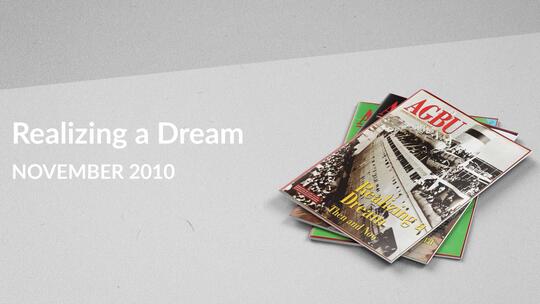From Washington, D.C. to Yerevan, Richard Giragosian has created a reputation as an erudite analyst of the gnarly politics that often bewilder the rest of the world (to the extent that anyone pays attention) in trying to decipher life in Armenia and its neighborhood.
Giragosian's challenge is to make sense of Caucasus-style politics, where rules are made up on a shifting political landscape that frequently appears lost in transition, even for scientists.
Giragosian—son of an Armenian father and English mother—first visited Armenia in 1999 on the invitation of the Organization for Security and Cooperation in Europe (OSCE) to conduct training for the staff of the Armenian Parliament.
By that time he had been a professional staff member of the U.S. Joint Economic Committee, was appointed twice as a State Commissioner on the Virginia Governor's Commission on Armenian Affairs, and served as an honorary member of the National Steering Committees of both the Clinton and Gore presidential campaigns. He wrote analyses for Radio Free Europe/Radio Liberty (RFE/RL) and for London-based Jane's Information Group, covering political, economic and security issues in the South Caucasus, Central Asia and the Asia-Pacific region.
Judging Giragosian's reason for leaving the nerve center of politics (D.C.), to settle in comparably sleepy and un-nerving Yerevan is not a science, but an analysis of the heart:
He fell in love with a Yerevantsi, Marine Manucharian. He moved, married, and, about a year ago, started a family, in the person of baby girl, Lilly.
"Moving to live here was more a personal decision than a patriotic one," says Giragosian, age 45. "It certainly wasn't professionally motivated, since I actually sacrificed in terms of career and finances to live here. But I do believe that many Armenians, including diasporans, have a unique role or mission in terms of contributing to a more democratic, more developed Republic of Armenia."
There is no "return to roots" at the core of his decision to live here. In fact, he says his Armenian identity has as much to do with circumstance, as with heritage.
"After my mother died, when I was nine, I became very close to my Armenian grandfather and that had a lot to do with the awakening of my Armenian identity, the wish to learn the language and the history," he says.
Now serving as director of the Armenian Center for National and International Studies, the analyst, like many who have recently made Armenia home, hopes to contribute to future history—in his case, by fostering more independent dialogue on issues of nation-building and globalization. He could observe from Capitol Hill, but he couldn't participate.
"Armenia offers a perspective that could not be satisfied in the Diaspora," Giragosian says. "It's a lot more effective and a lot more rewarding to be living in Armenia and not outside.
"It's a history-making period. The past decade and the coming one will be crucial in shaping the kind of Armenia we will have in the future and, in my personal opinion, we cannot afford the luxury of not being involved."
(Information reported by Gayane Abrahamyan.)






